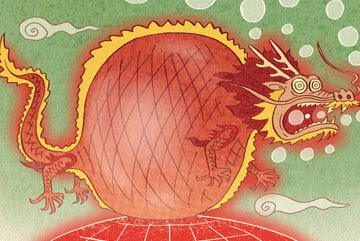by Mawer Investment Management, via The Art of Boring Blog
China surprised markets last week by devaluing its currency, resulting in an approximate 4% fall in the Yuan against the USD. This seemingly innocuous move caught most investors by surprise; stock markets went down and bonds rallied. It was an abrupt return to volatility after a couple of weeks of summer doldrums.
The size of devaluation is not so remarkable—a 4% fall in the Renminbi is hardly enough to dislodge economic growth or world markets. It’s what it may signal that’s important: slowing growth in China and a potential currency war. There are reasons to be concerned on both fronts.
Last One Standing
Since the beginning of the year, central banks have been engaged in a game of currency musical chairs. The game began when the Bank of Japan (BOJ) expanded and the European Central Bank (ECB) decided to engage in aggressive quantitative easing strategies, and it continued as commodity-exporting nations lowered their benchmark interest rates in response to weak global commodity prices. One by one, major economies around the world enacted policies that weakened their currencies and supported their exports until only two major currencies were left untouched: the USD and the Renminbi (with the Renminbi being pegged to the USD).
The outstanding question since the beginning of the year has been whether China and/or the U.S. would follow suit and devalue their currencies. If that happened, then all of the other country’s previous currency devaluations will have been for naught (if everyone lowers their price, no one gains a relative advantage) and the world will have collectively lowered interest rates—again. But if not, perhaps the other economies could gain a much-needed economic reprieve. Looking back, it seems like wishful thinking.
While the strength of the USD has been warranted by relative fundamentals, the strength of the Renminbi has not. China has been struggling against severe overcapacity in key industries, slowing economic growth, and plenty of bad debt. If its currency was not pegged to the USD, it would have weakened by now to reflect China’s current economic situation. But because of the peg, China has had to watch the Renminbi soar in lock step with the USD and an improving U.S. economy. This created a tension that seemed bound to eventually snap.
A Question of Intent
One of the main questions now is if China has intentionally restarted a currency war. China, somewhat ironically, insists that the devaluation of their currency was a “one-off” (it was made in two moves) in order to better position the Renminbi as a potential reserve currency with the International Monetary Fund (IMF). This sounds somewhat reasonable. China does have long-term motivation to let its currency float and unpeg from the USD. A status as a reserve currency would be one step on this path.
But there are reasons to be skeptical of this official rationale. If China does want or need to lower its currency further, then the last thing it wants is to spark retaliation from the impacted parties—which would be nearly every major economy. In currency wars, if everyone plays then everyone loses. Thus, China needs to play innocent. They need to be the player that enters the game and convinces everyone else not to. As the line from Charles Baudelaire’s The Generous Gambler goes: “the loveliest trick of the devil is to persuade you that he does not exist.” In other words, we should not necessarily expect the Chinese to be honest about their intentions.
A Signal on Growth
Even if we take China’s explanation for the devaluation at face value, it still provides reason for concern. It signals that China’s economic health is weak.
The prospect of a weak Chinese economy is certainly one reason why markets reacted negatively last week. China’s economy is an important contributor to global growth. If Chinese growth falters, there will be an impact on commodity-linked companies and countries. Trading partners will be affected. Companies who rely on Chinese growth will need to adjust their strategies, while investors will need to lower their expectations. Valuations in equity markets might need to be examined. The impact could be far-reaching.
Moreover, if China continues to devalue its currency because of its weak economy, the impact could be wider still. Anyone who competes against China for exports or manufacturing would feel it, including Japanese or European capital goods exporters, Mexican manufacturers, or South-East Asian service providers, to name a few. Indeed, it would be hard to pinpoint who wouldn’t lose if China further materially devalues the Renminbi.
Implications
It is far too early to know how current events will play out. It is entirely possible that the concerns held in the market will never come to pass. China may continue to grow at its historically blistering pace. It could avoid any further currency devaluations. Skepticism over Chinese intentions could prove wholly unwarranted.
However, recent events suggest the devaluation is a warning sign. Faltering Chinese growth implies that investors may want to be careful on the growth assumptions they are making in their investments. Now may not be the time to emphasize companies or countries whose goods or services would prove less competitive under a lower Renminbi regime. And recent trends in China could mean lower levels of inflation broadly in the world.
In our most recent investment meeting, the question was asked whether we think markets overreacted to the news out of China last week. The answer we gave: maybe. This answer depends on what the state of economic affairs turns out to be in China.
What we can say is this: we are far less concerned about markets overreacting to China than if they are underreacting. Like so many risks inherent in the investment world, the risks in China may take some time to be fully appreciated by the market. If China’s economy continues to deteriorate, the market does not yet seem ready for it.
Investors would do well to ensure their portfolios are built to be resilient no matter what unfolds in China.
Further reading:
Why does China’s currency have two names? (When to use “Yuan” vs. “Renminbi”)
How does China’s currency peg work?
This post was originally published at Mawer Investment Management














